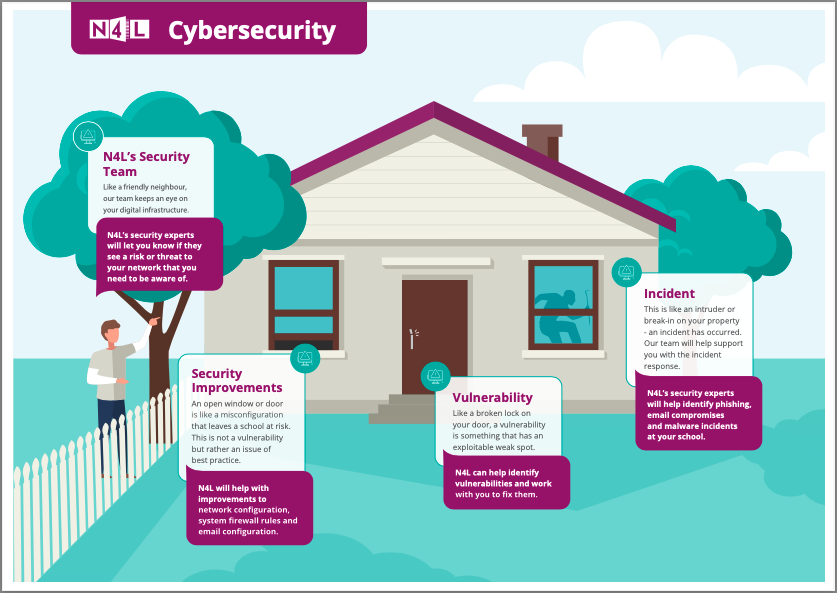Written by Bill Bennett Technology Journalist
Network for Learning’s (N4L’s) new cybersecurity services are helping to keep schools safe from online threats. These services were introduced at the end of March and expand N4L’s current security offering. It includes a dedicated group of security experts who monitor school networks for threats, vulnerabilities and attacks. If they find anything, they’ll get in touch with the school’s relevant IT staff, let them know what’s going on and help fix the problem.
Schools don’t have to wait for the experts to call, if there’s a problem or a concern, they can contact the team for support and advice. Beating cyber crime needs a team effort. While the N4L team can keep watch, it can’t do everything. The team can help take some of the technical burden so school leaders can focus on other aspects, but it’s important schools stay on top of their own cybersecurity.
Johnny Sandiford, Acting Head of N4L’s security team says the approach is based on the way commercial organisations deal with cyber crime. He says: “They use a cybersecurity framework. These are often complex and burdensome to fund or maintain, so we’re building a simpler version that schools can use. It means you can maintain your cybersecurity journey with the tools you already have available to you. Our experts are on hand to provide guidance to show schools the best actions they can take to protect their network before any problems arise”.
Security threats are real. N4L’s network monitoring has shown that the number of threats and incidents continues to increase. Between 1 Feb and 9 July 2021 N4L blocked 3.2 million online security threats every day, or 2,200 each minute. This is a 64% increase in 2021 compared to the previous year.*
N4L’s security team can step in if they think a student or staff member has clicked a phishing link or if it looks like an email account has been hacked. They watch for unusual traffic patterns; these are often a sign of actual or pending criminal activity. If they spot a risk, there’s an active attack underway or if it looks like a device on the network has been infected with malware, N4L’s security team will step in.

Sandiford says the first and most obvious benefit is that N4L’s cybersecurity services are free to schools and fully funded by the Ministry of Education. There’s nothing schools need to do to join, every school supported by N4L is automatically enrolled.
He says: “Cybersecurity isn’t something you do once and forget, it’s a journey. N4L will help get a school started on that journey and support them along the way. From there leaders can take a deeper look and assess where the school’s cybersecurity sits, before looking at the things that can improve that position.”
While technologies and tools can help improve cybersecurity, a large part of the process involves awareness of the issues, training people and putting procedures in place. This might include showing people how to make better use of passwords, switching everything to multifactor authentication or checking software is up to date and applying the latest security patches. It also means thinking about cyber insurance, which is included as part of the Ministry of Education’s Risk Management Scheme.
Sandiford says: “Tools and platforms are important because they provide certain controls effectively, efficiently, and sometimes at a good cost. However, N4L wants to focus on the idea of building that cybersecurity framework, getting the senior leadership across security at their school and having them take ownership of the risks associated with it.
“Too often in the past, a school’s security depends on one person and can change if that person moves on. The idea is to build a framework that is resistant to change, so if a principal or IT leader leaves the school, it doesn’t have to start again from the beginning with security.”
For more information about N4L’s cybersecurity services, click here. You can also reach out to your School Relationship Manager or call N4L’s Customer Support team on 0800 LEARNING.
*Source N4L’s Data & Insights report 2021.
*Bill Bennett is an experienced editor and journalist specialising in technology and business. He has worked for New Zealand and international newspapers including the NZ Herald and The Australian Financial Review. He is also a regular technology commentator on RNZ Nine-to-Noon.

